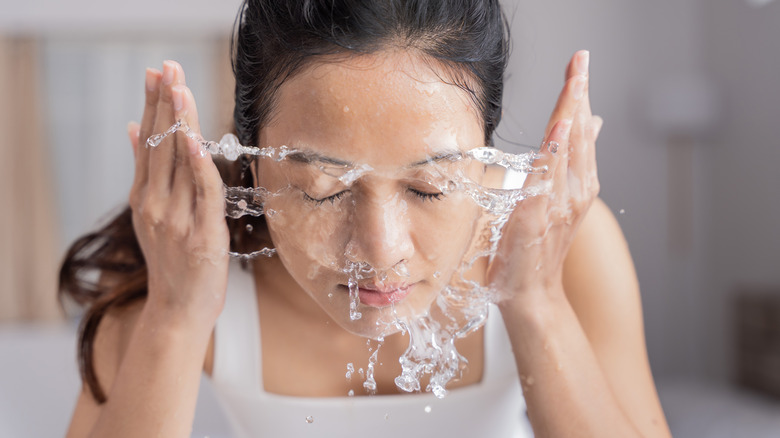What Really Happens To Your Skin When You Wash Your Face With Cold Water
Per Healthline, washing your face is "skin care 101"; it's an essential aspect of taking care of your complexion. Cleansing your skin helps to ensure that impurities like grime, pollution, and any bacteria are removed from skin, leaving your complexion looking clean and feeling refreshed.
Interestingly, there seems to be a lot of confusion about how you should be cleansing your skin, from the right products to use to the right temperature of water to cleanse with. There's a lot of confusion about whether cold water can actually benefit your skin and what really happens when you wash your face with cold water.
As Style Craze notes, when it comes to washing your face, it's best to use cold — or lukewarm — water rather than hot water. While there are few studies that show the scientific impact of using colder water to cleanse your face, there has been a lot of anecdotal evidence to support this trend. It's important to be aware of a number of factors when cleansing your skin using cold water, including the pH level of the water and how cold the water actually is. According to Healthline, cold water is classed as water that has a water temperature of below 70°F.
What are the benefits of washing your face with cold water?
Cold water can clear your skin in a number of different ways
According to Healthline, cleansing your face with cold water has a number of positive impacts on the skin. For instance, cold water washing can help to prevent acne from occurring. This is because hot water strips the oil from the skin, which then triggers the skin to produce more oil, which can cause overproduction of oil to begin or worsen — whereas cold water can help to regulate the skin's oil levels. Additionally, "while hot water opens pores, cold water closes them," the site notes. Closing the pores prevent dirt and bacteria from entering them, which can help to prevent pimples.
For managing skin conditions like rosacea, cold water can also be highly beneficial. Hotter water can cause more dilation of the blood vessels in the skin, making your skin look redder.
As per Style Craze, cold water helps reduce facial puffiness due to the cold water constricting the blood flow beneath the skin. It also increases hydration as cold water can help skin retain moisture, as well as reducing production of sebum. Cold water can also be used to combat swelling and inflammation, as well as helping to prevent the formation of wrinkles.

